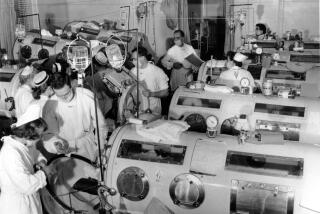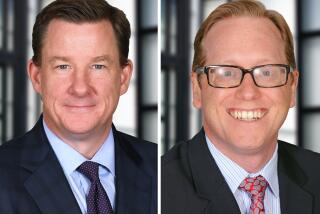Firm Curbed U.S. Anti-Smoking Efforts, Memo Says : Lobbying: A former Philip Morris official boasted of using influence with the White House to limit stances taken by the surgeon general.
A Philip Morris tobacco company official boasted of using influence with the White House and the federal Office of Management and Budget to curb attacks on smoking by U.S. Surgeon General Antonia Coello Novello, according to an internal company document.
The blunt memo also expressed satisfaction that, despite his anti-smoking rhetoric, Health and Human Services Secretary Louis W. Sullivan had “always stopped at the water’s edge when it comes to endorsing anti-smoking legislation. . . . There is a body of thought that tends to minimize his negative impact on us.”
The 1990 memo was written by James W. Dyer, then-director of Washington relations for Philip Morris, the top U.S. cigarette maker, and now a White House aide. It was leaked to an anti-smoking group known as Doctors Ought to Care, which made it available to The Times.
The memo said company lobbyists had not “directly urged that he (Sullivan) be muzzled” because “the media is sensitive to possible White House interference in his activities.”
Novello declined to comment, but a spokeswoman said she had repeatedly spoken out on the dangers of tobacco.
Sullivan, in an interview Wednesday, called the memo “incredible” and accused the company of arrogance for “trying to undercut or neutralize my efforts here.” This is “totally unacceptable” because “the evidence is incontrovertible that tobacco use is the No. 1 preventable cause of death in the United States,” Sullivan said.
The memo was one of many Philip Morris documents from 1989 and 1990 that were anonymously provided to Doctors Ought to Care, said Alan Blum, who heads the group.
Dyer, author of several of the memos, failed to return phone calls.
Barry Holt, Philip Morris vice president for corporate communications, said the memo appeared to be part of the “day-to-day discussions that go on, in terms of people and issues surrounding Washington. I don’t see anything unusual here.”
Holt also said that he had no way to verify the authenticity of the documents and that one memo provided by the anti-smoking group was slightly different from a version found in company files.
However, anti-smoking activists said the memos support their view that tobacco industry pressure on the Bush Administration has limited Sullivan’s and Novello’s freedom of action.
“It’s useful for them to say the right things, but they have been either unwilling or unable to support measures” to restrict cigarette advertising, ban tobacco sponsorship of sporting events and fund anti-smoking ad campaigns, said Cliff Douglas, tobacco policy director for the Advocacy Institute, a Washington-based group.
Sullivan, however, said that he had never been pressured by the Bush Administration to cool his anti-smoking stance, and said it was the Administration’s blanket opposition to new federal regulations that kept him from endorsing anti-smoking bills.
Several of the Philip Morris documents concerned the choice of a successor to C. Everett Koop, who became surgeon general on the strength of his anti-abortion views but became a scourge of the tobacco industry.
In a July 19, 1989, memo to Philip Morris general counsel Murray Bring, company Vice President David Greenberg, then head of the Washington office, spoke of the need “to identify several candidates” to replace Koop, “as well as consider ways to impede the viability of candidates openly hostile to our industry.”
In an Oct. 18, 1989, memo to former CEO Hamish Maxwell and other top company officials, Dyer said Novello had the inside track.
“We have been searching for any public statements, testimony, or speech material indicating her views on tobacco. We have come up completely dry,” Dyer wrote. She “seems to be a candidate least likely to interfere with our activities.”
Then in a memo to Greenberg in March, 1990, when Novello was confirmed, Dyer said: “We intervened with the White House, OMB and HHS to urge that Dr. Novello take no position on any pending anti-tobacco legislation. We stressed to her handlers and to interested parties that we were interested in making sure she focused on non-tobacco health problems. We were successful in that both of our objectives were met.”
Novello did speak out on tobacco, however, making her first major speech on the subject two months later.
Other memos reveal Philip Morris’ dilemma when Turkish officials sought help in defeating a resolution, pushed by Sen. Bob Dole (R-Kan.), to make it the official U.S. position that the killings of Turkish Armenians early in this century was a massacre and not an act of war.
Philip Morris has extensive interests in Turkey, which is a major importer of U.S. cigarettes, a supplier of Oriental tobacco leaf and the company’s joint venture partner in a new cigarette factory.
But the company should “do nothing to upset Sen. Dole,” an October, 1989, memo says. “He is too valuable a friend to alienate over this issue.”
Still, Philip Morris officials advised Turkish government representatives that “we are confident that this resolution will not be enacted.” It was defeated on a close Senate vote in February, 1990, prompting Dole to accuse his colleagues of being more interested in “American companies’ profit margins” than in addressing past wrongs.
More to Read
Sign up for Essential California
The most important California stories and recommendations in your inbox every morning.
You may occasionally receive promotional content from the Los Angeles Times.










